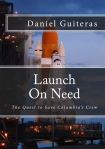Launch on Need by Daniel Guiteras (small books to read txt) 📗

- Author: Daniel Guiteras
Book online «Launch on Need by Daniel Guiteras (small books to read txt) 📗». Author Daniel Guiteras
Right now, though, Jan is mostly physically uncomfortable in her spacesuit. She knows she’s fortunate to be out on a contingency EVA, that it’s the kind of thing we wish for. With all the tedious training we do on the ground for activities in space, well, sometimes it feels so rehearsed that when we get into space—I was going to say it’s almost boring, but no it’s not that, because that would be the wrong word for it. It’s more that our actions become robotic in nature, one movement after another, as we follow the well-rehearsed choreography from the procedures cards. So, when a contingency comes along, it gets everyone’s attention, and things get interesting. We’re given the chance to think in space. It’s what we as astronauts live for—and it’s what gives NASA engineers nightmares.
“Houston, Steve here, I’m at my mark.”
“We copy you, Steve, we’re ready when you are.”
I use the payload bay door to help rotate myself so I can go down onto the wing, facing Jan’s back, like when you back down a ladder.
“Jan, I’m above you now and I’m about to grab your backpack… let me just get my right hand… now my left. Okay, I’m there.”
“Okay, Steve, copy that, I’m holding steady.”
“Houston, I’m heading down to the leading edge.”
“Houston, for Steve, we copy.”
Hand over careful hand, I descend Jan’s backpack, my waist tether shifting back and forth on the slide wire above, mimicking my movements. Then I grip her spacesuit pants, backs of her knees and finally the strap around her left ankle.
“Houston, I’m at the strap.”
“We copy, and we wait for your report.”
I slip my left glove through Jan’s ankle tether, then close my hand tight just below the buckle. I push against the tether gently so I can move lower on the wing. I am now suspended from the tether, my left arm stretched up over my head, my feet dangling below me, pointing out into the nothingness of space. My helmet is directly in line with the leading edge of Columbia’s left wing.
As close as I am now to the wing, I still can’t see much of anything. I even lift my mirrored outer visor briefly, but it doesn’t help much, just makes me squint more. Our orbiter is backlit by the sun, giving the wing a white halo effect. It’s like in a photograph where the subjects are backlit and their faces become almost indistinguishable; the easiest way to combat this problem of course is to use a flash. I don’t have a camera flash with me, and the light on my helmet-mounted video camera has been turned off to save the battery—there is no way I can turn it on now. But I do have my helmet lights.
I look down past the inside lower edge of my helmet out to the control module of my spacesuit. It’s similar to a dashboard on a car, in that it has displays, controls and various function selectors. All the knobs and switches are labeled and oriented so that I can read them as I look down at them. I have four lights on my helmet, two on each side, and each one can be turned on or off separately from the control module.
I reach down and turn on all four lights at once.
When they come on, the strangest thing happens. The matte-black color of the RCC panels at the edge of the wing, and the thermal tiles just below the panels, begin shining back at me, reflecting the light from my helmet.
Light is being reflected back at me! This is not a good sign.
I realize the source of the reflection. It is the polished stainless steel attachment fittings and the aluminum alloy trusses. Vital internal wing components are reflecting the light from my helmet.
It is then that I know we are screwed.
“Columbia, Houston for Steve… we’re standing by for your report, over.”
I am the only person in the world—universe, really—who knows how bad the damage is. What can I say to Houston? I just want to be alone for a while. Now I, too, don’t feel so well. When they hear the news, they, being Houston, will feel compelled to say something to make us all feel better. But really, what options do we have?
This bird ain’t comin’ home.
Soon, everyone will know. They are all patched in to my comm channel—Jan, the crew, Houston, and probably another several hundred people throughout NASA. I can picture them perfectly: Nearly everyone is standing from the anxiety of the moment, either tapping out worried rhythms on their consoles or pacing back and forth.
I stall as long as I can. I know I have less than 30 seconds of dead air before Houston pleads for a response. I take another look at the hole with its sharp terrible edges. The wound might as well be in me, a full-thickness tear in my spacesuit or a crack in my helmet—for I am as dead as Columbia is.
I look away, overhead, up past Jan at the semicircle of Earth that is in view. Somewhere down there, my wife, even at this early morning hour, is busying herself with menial tasks. It is what astronaut spouses do when their loved ones are assigned a contingency spacewalk, especially when the objective is to scout for damage. I imagine her briskly pacing from one room to another, straightening as she goes, picking up a stray pair of scissors, a hair clip, a single sock, and depositing each item in its proper place. Then she is on to the family room,





Comments (0)